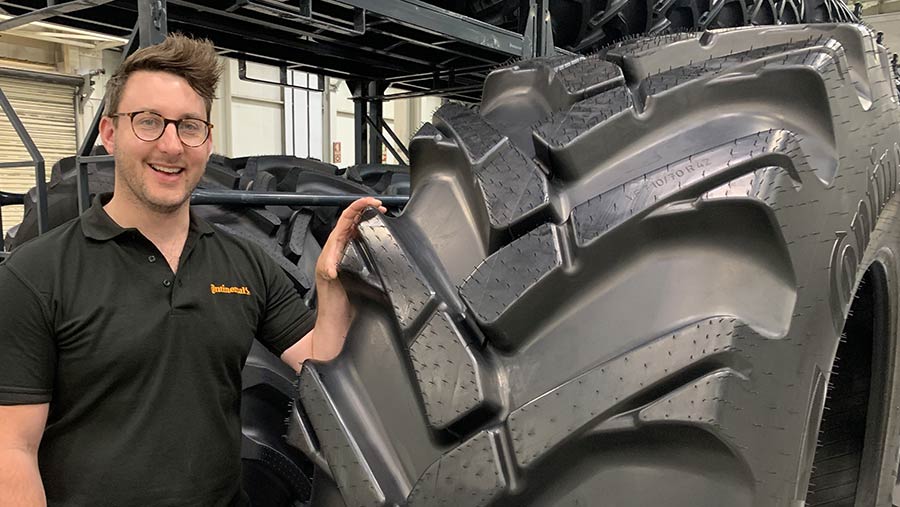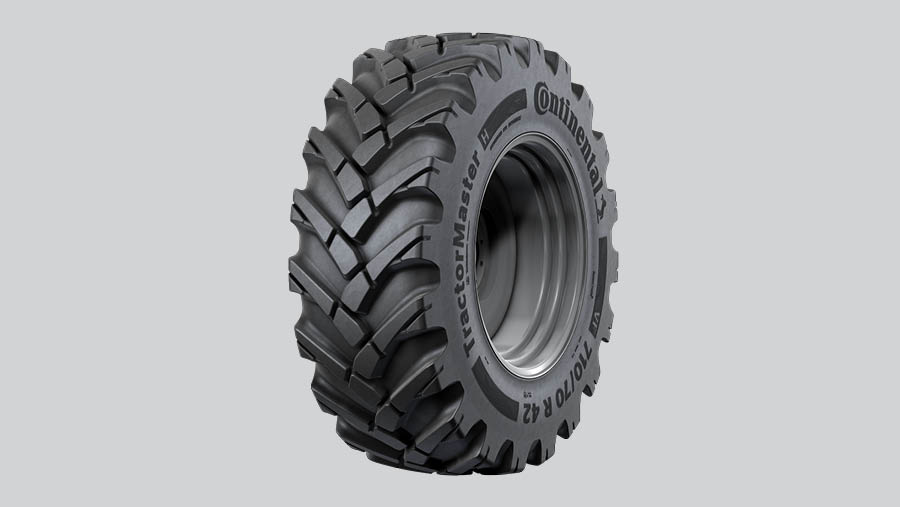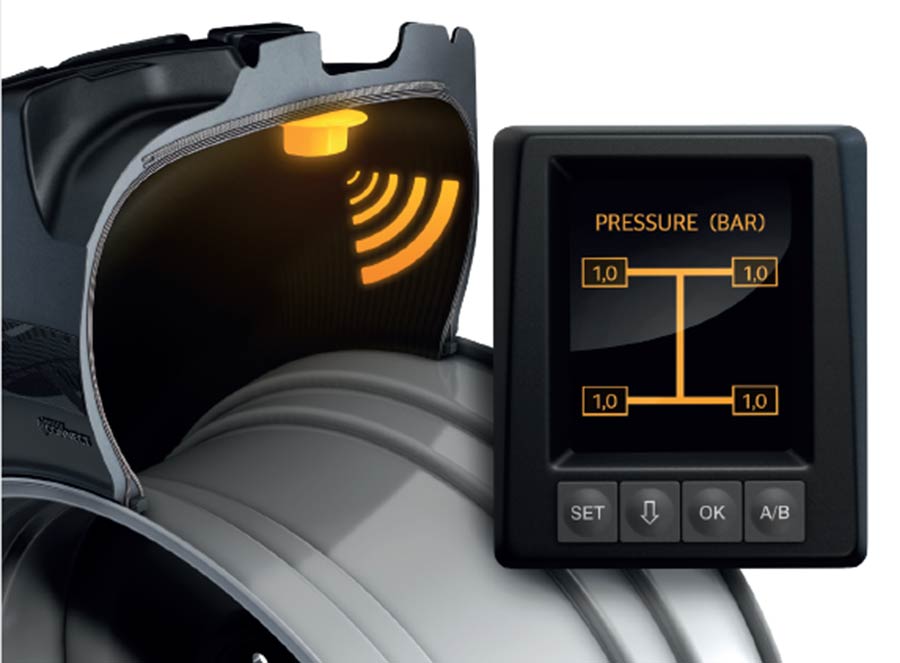Continental expands road-biased Hybrid tractor tyre range
 Tom Godwin with the VF TractorMaster Hybrid © Continental
Tom Godwin with the VF TractorMaster Hybrid © Continental With contractors and large farming enterprises now running their tractors over longer distances on the road, Continental aims to attract more users to its “hybrid” tyre with the addition of new sizes.
All tyre designs represent a compromise between the characteristics needed for field use and road journeys, and those with a traditional lug tread pattern are clearly biased towards traction in the field.
The VF TractorMaster Hybrid meets different priorities with a tread pattern composed of multiple blocks of different shapes that place more rubber down the centre of the tyre for minimum wear, noise and vibration during road travel.
To exploit this arrangement, the tyre cross-section responds to various inflation pressures in a way that differs from field-biased tyres.
See also: High-flexion tractor tyres; how they work and what they cost
Agricultural sales manager Tom Godwin explains: “Our Tractor 75 and 85, and the TractorMaster tyres, maintain a flat, broad-shouldered cross-section across different pressures because that’s what you need for maximum field traction.
“But while the Hybrid’s carcass structure does much the same at low pressure, pumping more air in to increase the pressure results in a more rounded cross-section with a smaller footprint concentrated on the large blocks down the centre.”

© Continental
That makes the tyre suited to contract lime spreading, muck and slurry application and similar operations involving a lot of road work during the task and when travelling between jobs, he suggests, and is particularly useful on tractors equipped with a central tyre inflation system.
At present, just one front/rear size combination is available – a 600/70 R30 168D paired with a 710/70 R42 182D capable of carrying 8.5t at 2bar or just over 3,490kg at as little as 0.4bar.
While those sizes suit the likes of a Fendt 828 or John Deere 6R 125 to 6R 250, the new sizes expected later this year are designed for tractors similar in size and power to Deere’s 8R.
A 650/65 R34 front fitment will be matched with a 710/75 R42 184D, the extra air volume contributing to a load capacity of 9t at 2 bar for up to 65kph.
Like all Continental’s tractor, harvester and loader tyres, the VF TractorMaster Hybrid is built in a €50m (£43m) factory in Portugal that brought the German manufacturer back into the agricultural tyre market after a six-year absence.
In addition to supplying the replacement market, Continental has earned approval from John Deere, Fendt, Case IH and New Holland for supplying factory-fitted tyre options, from Krone for forage equipment, and most recently from Valtra and Massey Ferguson for their tractors.
Pressure Check tyre monitoring kit
With mobile device apps and digital tyre monitoring systems now widely available, tractor operators have never had such a wealth of information at their fingertips to make the most of the advanced tyres their machines run on.
And making use of that information can help make tractor operations more productive, with the least impact on soil structure, and extend tyre life, suggests Tom.
“With decreasing farm payments and costs rising across the board, a lot of farmers and contractors are extending their machine ownership from typically five years to seven or eight and 6,000 hours,” he points out.

The ContiPressureCheck system with an in-cab display © Continental
“It’s ideal if the tyres on those machines can work through that period without being changed and maybe running up a £10,000 bill on a 200hp tractor; and that’s feasible if the tyre set-up is optimised for different tasks.”
The firm’s technical specialists can give on-farm advice on tyre choice and pressure settings, if necessary weighing individual tractor and implement combinations for bespoke guidance.
Otherwise, a mobile device app is a good place to start, as an easily accessible digital version of the load-pressure tables previously available only in bulky print form.
Continental contributed to the multi-brand Agro Tyre Pressure app introduced recently, but its own is more sophisticated, providing not only inflation pressure data for specific tyres and loads but also the front axle lead percentage for selected front and rear tyre combinations.
This will help avoid a set-up that exceeds the tractor manufacturer’s tolerances, a figure usually found on the side of the radiator or steering column shroud, and the potential driveline “wind-up” issues that would likely result.
On the move, operators can monitor the pressure and temperature in each tyre with the ContiPressureCheck kit, which comprises a sensor fixed to the underside of the tyre carcass that sends readings via Bluetooth to a receiver mounted in the tractor cab.
This then sends the data, alerts and warning signals to either a small LCD display or an Android phone, advantages of the latter being that operators can connect to any farm vehicle or implement equipped with the tyre sensors.
Data is also sent to the ContiConnect 2.0 web platform so that farm and estate managers can also access the live tyre data.
“We have users who will note a pressure increase as the day warms up after a cool, early start to drilling or cultivations and let out some air to maintain the optimum inflation setting for the load and tyre’s performance characteristics,” says Tom.
“It may change the inflation pressure by only a few psi, but that represents a big volume of air in a large, very flexible tyre, and can make a 20-30% difference to the tyre’s footprint and its impact on the soil.”
The dealer-fitted kit for tyres such as Continental’s VF TractorMaster high-spec radial costs £50 a tyre for the sensors plus £326 with the in-cab display or £304 for use with an Android phone, and is standard with the VF TractorMaster Hybrid road-biased tyre.

